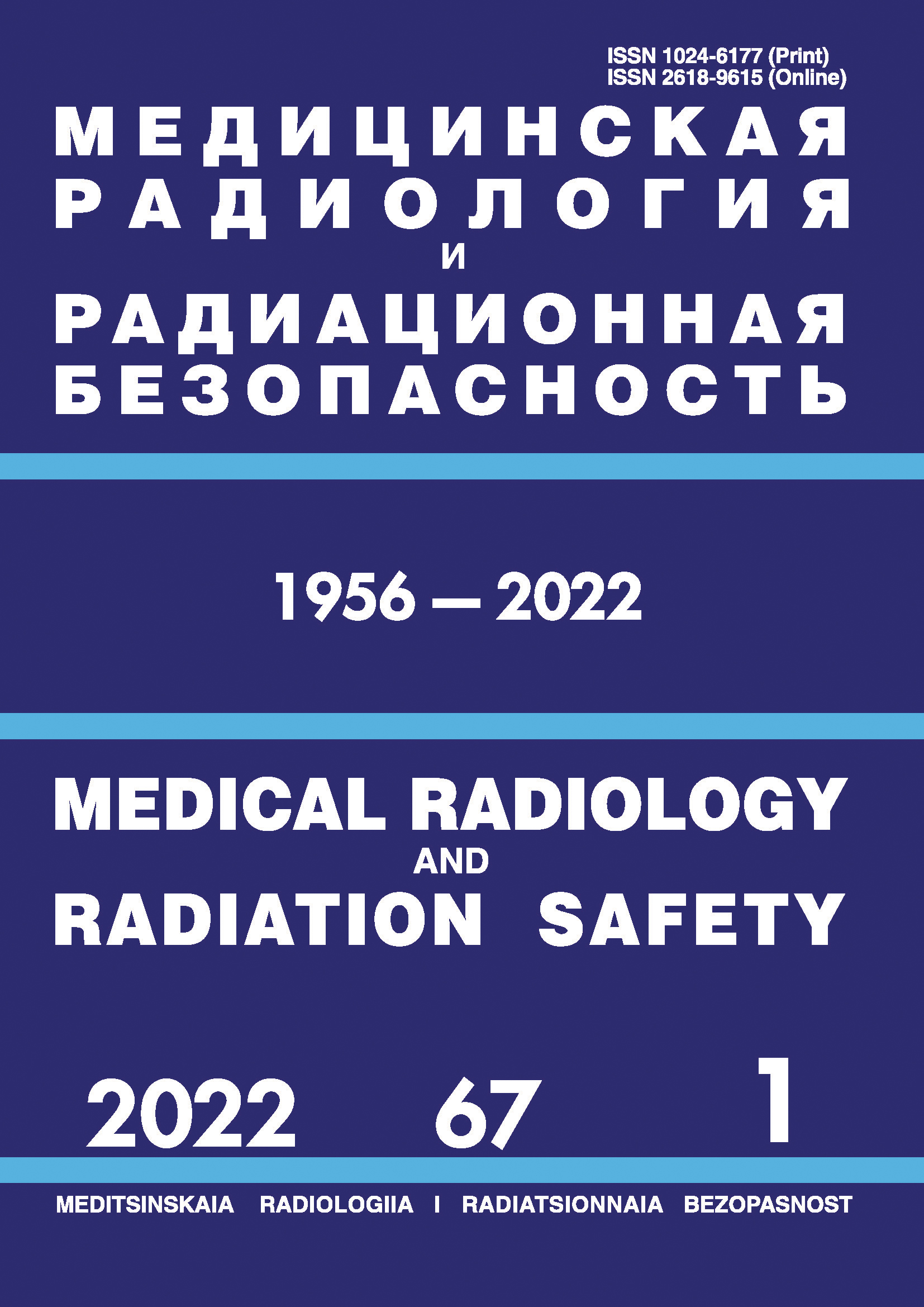Russian Federation
An experience of successful treatment of giant lymphocele and related secondary complications, such as signs of hydronephrosis of both kidneys of a patient after Wertheim surgery in case of cervical disease before radiotherapy is described. A complex of ultrasound studies using 3 types of echographic picture of the lymphocele was applied, which made it possible to determine the rational management of the patient using the technique of invasive sonography. Ultrasound examination, on the 17th day after the operation, revealed lymphocele in the iliac regions (1450 ml on the right, 1290 ml on the left) and signs of hydronephrosis of both kidneys. Drains under the control of sonography in both the lymphatic cavity were set up. Signs of hydronephrosis of both kidneys ceased to be located on the 2nd day after the installation of drains. Drains were removed after 13 days. During further ultrasound examinations of the patient, the lymphocele and signs of hydronephrosis were not rendered. Ultrasound examinations were performed on the 3rd, 7th, 12th, 21st, 35th, 62nd, 145th day after drains were removed.
cervical cancer, pelvic lymphadenectomy, radiation therapy, ultrasound, invasive sonography, lymphocele, lymphatic cyst
1. Ed. Kaprin A.D., Starinskiy V.V., Petrova G.V. The State of Cancer Care in the Population of Russia in 2018. Moscow, MNIOI im. P.A. Gertsena Publ., 2019. P. 5 (In Russ.).
2. Ed. Chissov V.I, Davydov M.I., Aleksandrova L.M. Oncology. National Guidelines. Short Version. Moscow, GEOTAR-Media Publ., 2017. P. 113-117 (In Russ.).
3. Boyko A.V., Dunayeva E.A., Demidova L.V., Dubovetskaya O.B., Serova L.G., Alekseyev B.Ya. Implemenation of Radiation Therapy for Locally Advanced and Recurrent Cervical Cancer Complicated by Ureterohydronephrosis. Meditsinskaya radiologiya i radiatsionnaya bezopasnost = Medical Radiology and Radiation Safety. 2019;64;4:41-47. DOI:https://doi.org/10.12737/article_5d1108af5d48d3.68800561. (In Russ.).
4. Makatsariya N.A. Ernst Wertheim. Akusherstvo, Ginekologiya i Reproduktsiya = Obstetrics, Gynecology and Reproduction. 2014;8;2:149-150 (In Russ.).
5. Ballester M., Bendifallah S., Daraï E. European guidelines (ESMO-ESGO- ESTRO consensus conference) for the Management of Endometrial Cancer. Bull. Cancer 2017;104;12:1032-1038. PMID: 29173977. DOI:https://doi.org/10.1016/j.bulcan.2017.10.006.
6. Cibula D., Pötter R., Planchamp F., et al. The European Society of Gynaecological Oncology. European Society for Radiotherapy and Oncology. European Society of Pathology Guidelines for the Management of Patients with Cervical Cancer. Radiother. Oncol. 2018;127;3:404-416. PMID: 29728273. DOI:https://doi.org/10.1016/j.radonc.2018.03.003.
7. Skreptsova N.S., Stepanov S.O., Guts O.V., Prozorova E.V. Invasive Sonography in Diagnostics and Treatment of Lymphocele of Patients after Pelvic Lymphadenectomy. Luchevaya Diagnostika i Terapiya = Diagnostic Radiology and Radiotherapy. 2013;3;4:83-88 (In Russ.).
8. Akhmetzyanov F.SH., Mardanova S.M. Ultrasound in Early Postoperative Period in Patients after Cancer Surgery on the Pelvic Organs. Sovremennaya Meditsina: Aktualnyye Voprosy = Modern Medicine. Actual Issues. 2016;7;49:21-33 (In Russ.).
9. Rogovskaya T.T., Berlev I.V. Lymphatic Cysts after Gynecological Cancer Surgery: Risk Factors, Diagnosis and Treatment. Opukholi Zhenskoy Reproduktivnoy Sistemy = Tumors of Female Reproductive System. 2018;14;4:72-79. DOI:https://doi.org/10.17650/1994-4098-2018-14-4-72-79. (In Russ.).
10. Ghezzi F., Uccella S., Cromi A. et al. Lymphoceles, Lymphorrhea, and Lymphedema after Laparoscopic and Open Endometrial Cancer Staging. Ann. Surg. Oncol. 2012;19;1:259-267. PMID: 21695563. DOI:https://doi.org/10.1245/s10434-011-1854-5.
11. Kim Y.H., Shin H.J., Ju W., Kim S.C. Prevention of Lymphocele by Using Gelatinthrombin Matrix as a Tissue Sealant after Pelvic Lymphadenectomy in Patients with Gynecologic Cancers: a Prospective Randomized Controlled Study. J. Gynecol. Oncol. 2017;28;3:37. PMID: 28382800. DOI:https://doi.org/10.3802/jgo.2017.28.e37.
12. Kondo E., Tabata T., Shiozaki T. et al. Large or Persistent Lymphocyst Increases the Risk of Lymphedema, Lymphangitis, and Deep Vein Thrombosis after Retroperitoneal Lymphadenectomy for Gynecologic Malignancy. Arch. Gynecol. Obstet. 2013;288;3:587-593. PMID: 23455541. DOI:https://doi.org/10.1007/s00404-013-2769-0.
13. Tinelli A., Mynbaev O.A., Tsin D.A., et al. Lymphocele Prevention after Pelvic Laparoscopic Lymphadenectomy by a Collagen Patch Coated with Human Coagulation Factors: a Matched Case-Control Study. Int. J. Gynecol. Cancer. 2013;23;5:956-963. PMID: 23574881. DOI: 10.1097/ IGC.0b013e31828eeea4.
14. Yin H., Gui T. Comparative Analyses of Postoperative Complications and Prognosis of Different Surgical Procedures in Stage II Endometrial Carcinoma Treatment. Onco. Targets Ther. 2016;9:781-786. PMID: 26937200. DOI:https://doi.org/10.2147/OTT.S95806.
15. Zikan M., Daniela F., Pinkavova I., et al. A Prospective Study Examining the Incidence of Asymptomatic and Symptomatic Lymphoceles Following Lymphadenectomy in Patients with Gynecological Cancer. Gynecol. Oncol. 2015;137;2:291-298. PMID: 25720294. DOI:https://doi.org/10.1016/j.ygyno.2015.02.016.
16. Vaskovskaya O.V., Asabayeva R.I., Digay L.K., Kokoshko A.I. Complications after Gynecological Cancer Expanded Operations. Nauchnoye Obozreniye. Meditsinskiye Nauki = Science-Review. 2014;1:58-59. URL: https://science-medicine.ru/ru/article/view?id=63. (In Russ.).





